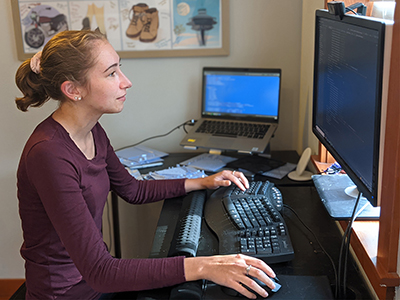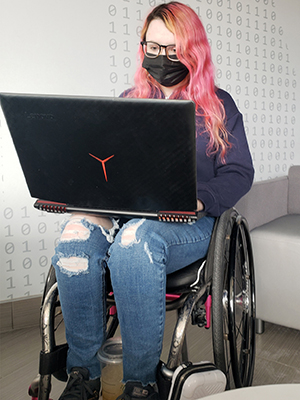Supporting Women and Gender Marginalized Students with Disabilities in Computing Research
 Funded by the Computing Research Association, the goal of AccessUR2PhD is to support women and gender-marginalized individuals with disabilities (WGMD) on the pathway from being an undergraduate researcher to earning a PhD in a computing field. To realize this goal, the project will work toward two objectives:
Funded by the Computing Research Association, the goal of AccessUR2PhD is to support women and gender-marginalized individuals with disabilities (WGMD) on the pathway from being an undergraduate researcher to earning a PhD in a computing field. To realize this goal, the project will work toward two objectives:
To provide direct support for WGMD students interested in computing research through mentoring, leadership, and training activities.
To develop and disseminate resources to support (1) WGMD students in computing research and (2) faculty and graduate students who are mentoring WGMD students.
AccessUR2PhD represents a joint effort between the DO-IT Center and the Allen School at UW.
Project Activities and Resources
Mentoring: Student participants of AccessUR2PhD will join the AccessComputing online mentoring community, which contains mentors and students with disabilities in computing fields from across the country. Project staff will facilitate broader mentoring, connecting students with one another and with mentors through mentoring circles.
Webinar Series: Project staff will host webinars for a national audience to disseminate resources informed by project activities and the voices of WGMD computing students and faculty.
 Project Video: Informed by project activities and the lived experiences of WGMD computing students and faculty, project staff will create one or more video productions about being successful as a WGMD student in computing research and/or best practices to engage such students in computing research.
Project Video: Informed by project activities and the lived experiences of WGMD computing students and faculty, project staff will create one or more video productions about being successful as a WGMD student in computing research and/or best practices to engage such students in computing research.
Connections with UR2PhD: Participants will be referred to the UR2PhD undergrad research methods course, mentor training program, and workshops. The project will also encourage other AccessComputing participants to engage with UR2PhD programs and offer support to UR2PhD to increase the accessibility of its activities and disability-related information contained therein.
Resources and Publication: Based on the webinar series and input from participants, the project will develop and publish information briefs on topics such as advice for WGMD getting started in undergraduate research, succeeding in graduate school as a WGMD student, or supporting WGMD students as a mentor.
To get involved in AccessUR2PhD activities fill out the student interest form. To get more information send an email to accesscomp@uw.edu.
UR2PhD Leadership Team
Dr. Brianna Blaser (PI) has led multiple high-level projects to increase the participation of people with disabilities in computing education and careers. She is the Director and Co-PI for AccessComputing and PI for AccessADVANCE, an NSF-funded project focused on women with disabilities in STEM faculty careers. Her work includes direct interventions for individuals with disabilities and supporting faculty, employers, and other stakeholders to create measurable institutional change.
Scott Bellman (Co-PI) manages the University of Washington’s Disabilities, Opportunities, Internetworking, and Technology (DO-IT) Center and serves as PI of Neuroscience for Neurodiverse Learners. He is the UW PI and West Coast Hub Leader of the Eddie Bernice Johnson Alliance TAPDINTO-STEM. Scott serves as Co-PI of SEEN Tech Professionals and Co-PI of AccessUR2PhD, funded by the Computing Research Association. He is Director of Diversity at the UW Center for Neurotechnology, and an editor of the book Perspectives of STEM Students with Disabilities.
Dr. Maya Cakmak (Co-PI) is an associate professor in UW’s Paul G. Allen School of Computer Science and Engineering with a specialization in human-robot interaction. She is PI of AccessComputing. Her research includes projects on assistive robotics for people with severe motor disabilities. She is the winner of the 2022 Anita Borg Early Career Award for advancing innovation and broadening participation in human-centered robotics.